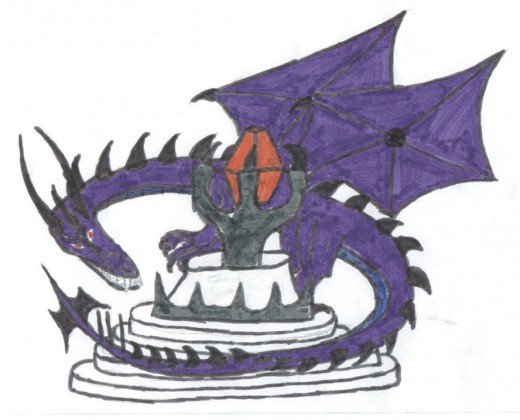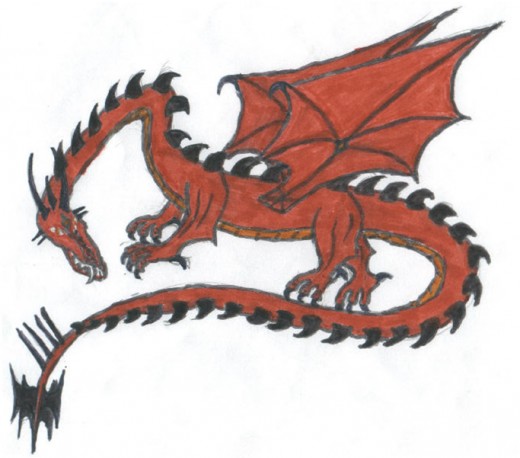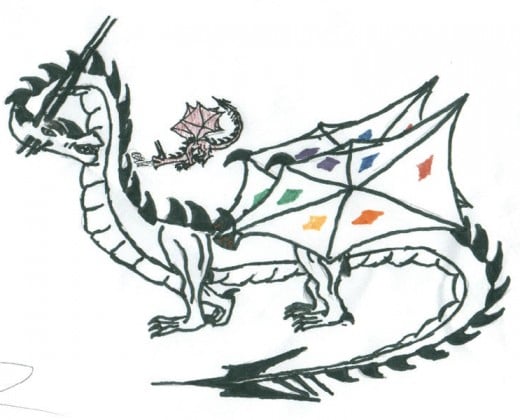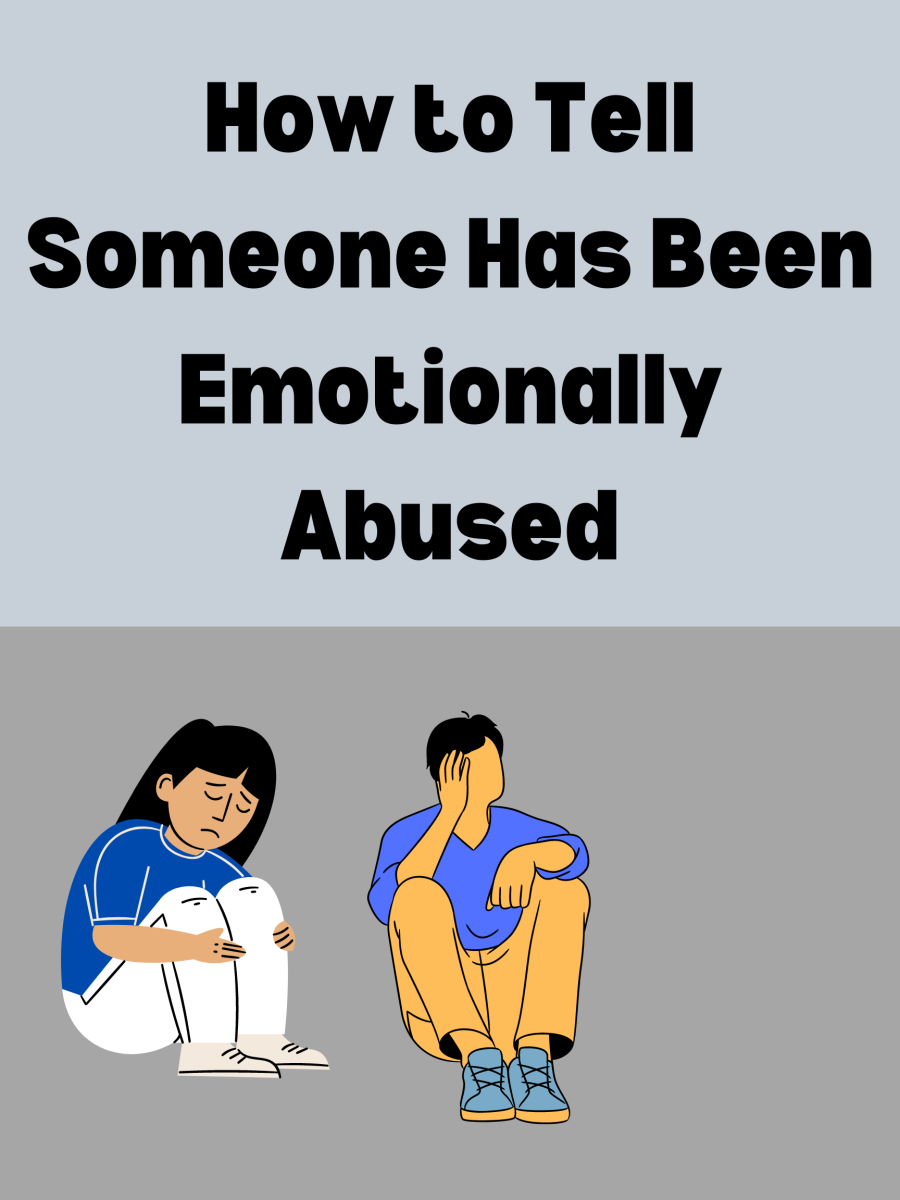Fighting DRAGONS - Depression, Rage, Anxiety, Guilt, and Other Negative Self Esteems
Life is a daily battle when
you are fighting dragons.
It is so hard....
Time goes by slowly....
No one seems to understand.
Sometimes, it just isn't worth
even trying anymore....
D = Depression
R = Rage
A = Anxiety
G = Guilt and
O = Other
N = Negative
S = Self-Esteems
Illustrations by Daniel James Anderson, Jr., age 10.

The Dragon of Depression
Symptoms of Depression:
- Feelings of worthlessness
- Indecisiveness
- Thoughts of death
- Fatigue or lack of energy
- Diminished interest in normally enjoyable activities
- Significant changes in weight, either loss or gain
- Restlessness to the point of sleeplessness
- Lack of caring about self or others
Everyone has days where they feel down or blue. These are considered to be normal. See a physician, however, if these feelings last for two weeks or more without letting up. Thoughts of suicide or death, or symptoms that interfere with family functioning or occupational competence are serious enough to seek help. Depression can be the result of chemical imbalances brought on by physical illness, childbirth, menopause, or low thyroid. Substance abuse can trigger depression, whether with over the counter medications or those bought on the illegal market. Medical intervention is wise to rule out possible physical ailments that mimick symptoms.
Depression can be triggered by thought patterns that dwell on the negative. Doubt, criticism, fault-finding, exaggeration, unrealistic expectations, perfectionism, "If only" thinking, making false assumptions, and complaining. Check these negative thought patterns by focusing on their opposite. If experiencing doubt, focus on faith. If self-criticism is a problem, find things that you like about yourself. To avoid exaggeration, look for truth. Acknowledge limitations to keep unrealistic expectations in check. Counteract perfectionism by allowing areas of "grey" to soften the black and white.

The Dragon of Rage
Symptoms of Rage:
- Desire for control over the actions of others
- Angry outbursts that inflict physical or emotional harm in the self and others
- Lack of tolerance for other's weaknesses
- Unresolved frustration due to disappointment from unmet expectations
- Inability to cope with stressful situations in a professional manner
- Self-loathing
Rage is more than anger, it is strong negative emotion that has festered to the point that it can no longer be contained. There is no kindness, understanding, or ability to cope, rather, lashing out at self and others in an effort to scrape the poison from the wound. Unfortunately, with every episode, the gash becomes deeper and the pain more poignant.
In order to deal with rage, we have to go right to its root. Rage often comes from feeling that we have been robbed of something that we thought was rightfully ours. Our first reaction is to retaliate, and punish the other person, but in our hearts we know that is wrong. We stuff the emotion, thinking that we cannot act upon it.
The problem only intensifies. We end up hating the other person for what they have done, and subconsciously retaliate against them by withholding our affection or services. We may turn a cold shoulder, or undermine what they are doing. We may even become controlling and manipulative in an effort to change the outcome of the situation, or turn to substances in an effort to drown or escape the pain.
In order for rage to go away, we have to resolve the problem that caused it. This may mean going to the other person and working through the situation to find a workable solution. It is up to us to see that our own needs are met, no one else will do that for us. If we cannot work through the situation with the other person, spiritual rejuvenation may be the only option.

The Dragon of Anxiety
Symptoms of Anxiety:
- Persistent worry about what might happen
- Inability to live within the present moment
- Fight or flight response without the presence of real danger
- Frequent checking and rechecking for no reason
- Feelings of panic
- Avoidance of circumstances or people due to excessive fear
- Racing thought patterns
Anxiety is the manifestation of physical symptoms in the form of hyper arousal or awareness of one's surroundings to the point of discomfort and aggitation. Sweating palms, heart palpitations, feelings of being watched, shakiness, nervousness, stomach upset, headaches, and muscle tension all signal the onset of anxiety. It may be triggered by memories associated with specific events, or induced by physical ailments that trigger the fight or flight response.
"What if.." thoughts trigger an anxiety response that snowballs to the point of being out of control. Use visualization techniques to lasso the snow-ball and slow it down, or tumble over it in clown-like fashion with ridiculousness. The "What if" thoughts are usually founded on assumptions that are un-true. Find the truth and focus on it instead.
Anxiety can be a conditioned response as the result of being exposed to ongoing trauma. Whether through abuse and neglect, wartime involvement, or physical illness, once anxiety is the automatic response, it can only be changed through the use of medication. Coupled with cognitive therapy, responses can be un-done and new responses conditioned.

The Dragon of Guilt
Symptoms of unwarranted or unproductive Guilt:
- Always apologizing, even if there is no wrong-doing
- Looking down, rather than looking others in the eye
- Playing the victim, feeling sorry for oneself
- Making excuses to get out of responsibility
- Hiding from others to avoid being found out
- Feeling that you are not good enough
- Excessive self-criticism
Unwarranted or unproductive guilt is the result of irrational thinking patterns focused primarily on fault finding in the self. It may be the result of over-critical or authoritarian parenting styles, bullying by peer groups, or discrimiation due to race, color, or religion. Any feelings of positive self-worth are destroyed in an onslaught of demeaning words and actions that are repeated within the mind of the individual.
Fortunately, these types of dragons respond to unconditional love. Once found, whether through friends, colleagues, or extended family members, guilt is swept away and replaced with a garden of self-affirmations. The soul is able to heal, the self renewed, and feelings of confidence engendered.

Other Negative Self-Esteem Dragons
Symptoms of Other Negative Self-Esteems:
- Lack of direction in life
- Non-caring attitude
- Sleep and appetite disturbances
- Low self-respect
- Discouragement and disappointment
- Emotional distress
- Lack of financial responsibility
- Poor family relationships
- Inability to keep employment
Negative self-esteems come from a variety of sources ranging from ill health to natural disasters. They are as individual as the people who have them, and result in billions of dollars of medical treatment every year. Lost work productivity and family dysfunction are only two of the many side affects.
Difficult situations wear a person down emotionally, spiritually, and physically. It is during these times of weakness that the dragons come out. Preparation is necessary during the good times, including eating good foods, getting adequate rest, building physical strength, storing knowledge and wisdom, and establishing emotional resilience through regular spiritual activity. Resilience enables one to think quickly and thwart the onslaught of negativity before the dragon has a chance to get close enough to inflict harm.
What dragon do you fight most?
How to Train Your Dragon
Just as Hiccup found in the movie How to Train Your Dragon, dragons are terrible pests. They are bothersome, do hurtful things, and make you feel worthless. The key to changing the situation is understanding your dragons. The dragons in the movie were stealing the villagers' animals, not for their own food, but to appease the monster in the volcano mountain that was controlling them.
Every dragon in your life has a source. It may be a triggering event, a set of words, an emotional memory, or a personal weakness that opens the floodgates and allows the dragon to come at you with all of its fury. Finding that source and dealing with it takes away the dragon's power to hurt you. Rather, you are able to recognize where the gate is, how it is opened, what the dragon does when it comes out, and how to keep the dragon at bay. You will have the skills necessary to "train" your dragon, and use it to bless, rather than curse your life.
This content is accurate and true to the best of the author’s knowledge and does not substitute for diagnosis, prognosis, treatment, prescription, and/or dietary advice from a licensed health professional. Drugs, supplements, and natural remedies may have dangerous side effects. If pregnant or nursing, consult with a qualified provider on an individual basis. Seek immediate help if you are experiencing a medical emergency.
© 2012 Denise W Anderson







